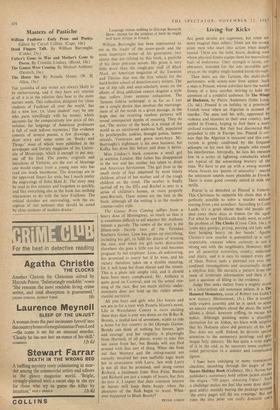Masters of Pastiche
William Faulkner : Early Prose and Poetry.
(Calder, 25s.) Father's Gone to War and Mother's Gone to (Deutsch, 16s.)
THE juvenilia of any writer are always likely to be embarrassing, and if they have any interest at all it is in the relation they bear to the more mature,work. This collection, designed for 'close students of Faulkner all over the world,' has bit a new low. (A 'close student' may be one who parts unwillingly with his money, which accounts for the comparatively low price of this volume; the language of American professors is full of such tedious mysteries.) The evidence consists of several poems, a few drawings, a short story and some notes on 'Books and Things,' most of which were published in the newspaper and literary magazine of the Univer- sity of Mississippi, which is enough to put any- one off his feed. The poems, originals and imitations of Verlaine, are the sort of bleatings one would expect from a young man who has read too much Swinburne. The drawings are in the approved Smart Set style, but I much prefer the engravings of John Held Jr. The story may be read in five minutes and forgotten as quickly, and like everything else in the book has nothing whatsoever to do with the later Faulkner. The critical sketches are unrevealing, with the ex- ception of one sentence that should be noted by close students of modern drama: Language means nothing to [George Bernard] Shaw: except for the accident of birth he might well have written in French.
William Burroughs has been represented to me as the leader of the avant-garde and the most important writer of his generation, two claims that are refuted by this book, a pastiche of his three previous novels. His prose is very little more than the tough-guy stuff of Black Mask, an American magazine of the Twenties and Thirties that was the first vehicle for the hard-boiled school of detective-story writers. The use of hip talk and semi-scholarly notes on the effects of drug addiction cannot disguise a style that suffers from extreme exhaustion. The 'famous fold-in technique' is as far as I can see a simple device that involves the rearrange- ment of all the words in a given passage, in the hope that the resulting random patterns will reveal unsuspected depths of meaning. They do not. The matter of the book is a vision of the world as an unrelieved scabrous hell, populated by psychopaths, junkies, thought police, homo- sexuals, Venusians and green newt-boys. Mr. Burroughs's nightmare is his own business, but Kafka has done this before and done it better.
Miss Lindsay's book concerns a small girl in wartime London. Her father has disappeared in the war and her mother has taken to drink and American Servicemen. The girl lives in the small circle of fear inhabited by most lonely children, afraid of her mother and of the rough children on the street. The mother is finally carried off by the DTs and Rachel is sent to a series of children's homes, or more properly semi-Borstals. These scenes are the best in the book, although all the writing is in the modern cinema-realist style.
The Games Were Coining suffers from a heavy dose of Hemingway, so much so That it is sometimes difficult to tell whether Mr. Anthony intends a parody. The centre of the story is the fifteen-mile bicycle race of the Trinidad Southern Games. Leon has given up everything, including his girl, to fulfil his dream of winning the race, and when the girl seeks distraction elsewhere she goes a little too far and becomes 'pregnant by her employer. Leon, all unknowing, has promised to marry her if he wins, and his victory therefore takes on a double meaning, for it will keep her from shame and the streets. This is a plain tale simply told, and it should have been more complicated; Mr. Anthony is quite good on Carnival, and on the actual run- ning of the race. But too much stylistic under- statement does not hold up the rather unsub- stantial narrative.
All you boys and girls who like horses and sex are in for a treat with Pamela Moore's novel. Life in Westchester County is more exciting these days than it ever was down on the B-Bar-B. Brenda, a zestful lass of seventeen, wants to ride a horse for her country in the Olympic Games. Brenda can think of nothing but horses, 'guts and courage' and her virginity. A playwright from Harvard, of all places, wants to take this. last away from her, but Brenda will not fool around with that sort of thing. When she finds out that Mummy and the riding-master are carnally involved her own ineffable logic leads her to intercourse with Larry. Sex with Larry is not all that he promised, and along comes Richard, a lieutenant from West Point. Brenda and Richard are just a couple of beats, but they do love it. I expect that their common interest in horses will keep them happy when the pleasures of the flesh begin to wane. What- ever happened to Black Beauty?
PETER COHEN


































 Previous page
Previous page